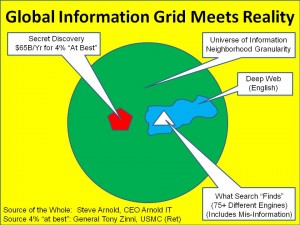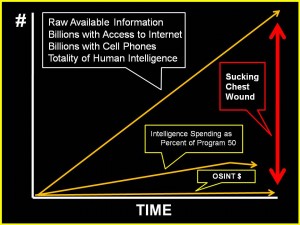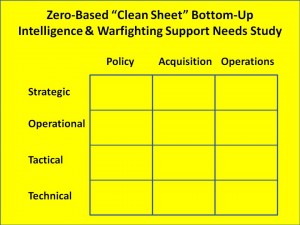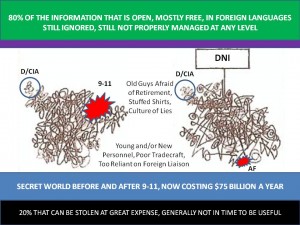The philosophical and leadership issue that has not been seriously addressed within the US and many other secret intelligence communities is this: are we in the business of secrets for the Presidet or are we in the business of informing statecraft at all levels? Until we have a political and policy leadership that demands the latter, our policies will continue to be uninformed and disengaged from the larger reality that will never, ever, ignore us.
Graphic: OSINT versus OSIS (Information Overload)
Advanced Cyber/IO, Balance, Capabilities-Force Structure, Citizen-Centered, Collection, ICT-IT, Innovation, Languages-Translation, Leadership-Integrity, Multinational Plus, Policies-Harmonization, Processing, Reform, Strategy-Holistic Coherence, Threats, TribesOriginally created by Dr. Mark Lowenthal, then with OSS.Net, Inc. and since modified, this slide, combined with Graphic: OSINT and Missing Information, depicts the challenge. What most do not understand is these two facts:
1. Open Source Information (OSIF) is not the same as Open Source Intelligence (OSINT). The latter is deliberately discovered, discriminated, distilled, and delivered decision-support tailored to a specific decision. No does this now in the IC that we know of.
2. Humans and Human Minds, not vast unaffordable non-interoperable technical processing farms, are how we cut to the chase. The magic of OSINT, as Dr. Stevan Dedijer stated so clearly in 1992, is to “know who knows,” so as to connect, as Robert Steele stated in Canada in 1994, the source with the consumer. This can only be done with Multinational Engagement, it absolutely will never happen if we continue to insist on US citizens with clearances as the heart of “national intelligence.”
Graphic: Critical View of Bureaucracy (Brazil)
Capabilities-Force Structure, Citizen-Centered, Leadership-Integrity, Multinational Plus, Policies-Harmonization, Political, Strategy-Holistic Coherence, TribesJournal: Secret World Still Short on All Languages
Collection, ICT-IT, Languages-Translation, Leadership-Integrity, Multinational Plus, Processing, Strategy-Holistic Coherence
IC's Language, Linguistic Shortfalls Under Scrutiny
by Anthony L. Kimery
Thursday, 21 January 2010
The IC still has important pockets of critical intelligence analysis that continue to suffer.
The rank and file analysts at the CIA, NSA and elsewhere throughout the Intelligence Community (IC) are patriotic, dedicated … hardworking. But they have long been hampered by a lack of both linguists and language proficient subject matter experts to help them make sense of the overwhelming storm of intelligence that is routinely siphoned from the air and gathered by human intelligence sources every day. This blizzard of information is blinding.
According to IC sources HSToday.us talked on background, the IC’s failure to detect the recent attempted terrorist attacks on the US homeland wasn’t just about the failure to connect the existing dots – of which there were many – but also was because of the inability to quickly and effectively interpret country-language specific intelligence, such as that which was collected in Yemen.
. . . . . . .
Last July, the Senate Select Committee on Intelligence reported that it “is concerned about the abysmal state of the Intelligence Community’s foreign language programs.”
The Committee’s report noted that “the collection of intelligence depends heavily on language, whether information is gathered in the field from a human source or from a technical collection system. Even traditionally nonlinguistic operations such as imagery rely on foreign language skills to focus and direct collection efforts.”
However, the Committee concluded, “almost eight years after the terrorist attacks of September 11th and the shift in focus to a part of the world with different languages than previous targets, the cadre of intelligence professionals capable of speaking, reading, or understanding critical regional languages such as Pashto, Dari, or Urdu remains essentially nonexistent.”
Continuing, the report stated that “the Intelligence Reform Act required the DNI [Office of the Director of National Intelligence] to identify the linguistic requirements of the Intelligence Community, and to develop a comprehensive plan to meet those requirements.”
But “five years later, the ODNI has still not completed an IC-wide comprehensive foreign language plan that designates specific linguist or language requirements, lays out goals or timelines, or designates specific actions required to meet them.”
Continue reading “Journal: Secret World Still Short on All Languages”
Graphic: Zero-Based “Clean Sheet” Needs Study
Advanced Cyber/IO, Analysis, Balance, Capabilities-Force Structure, Collection, Geospatial, History, ICT-IT, Innovation, Languages-Translation, Leadership-Integrity, Multinational Plus, Policies-Harmonization, Political, Processing, Reform, Strategy-Holistic Coherence, Threats, TribesJournal: Complexity to Avoid Accountability is Expensive
Capabilities-Force Structure, Leadership-Integrity, Reform
A central critique in my book, Defense Facts of Life: the Plans/Reality Mismatch (Westview,1985), what the trend toward increasing technical complexity in the Pentagon's weapons and organizational arrangements caused all sorts of self destructive pathologiess — which I described in considerable detail and in subsequent studies.
I defined “complexity” as a quality of the “whole” that relates the number, arrangements, and coordination of its “parts” to one's ability to comprehend the “whole.” It follows logically that increasing complexity runs up the number, multiplies the arrangements, and makes more intricate the coordination of the “parts,” and in so doing, makes it more difficult for one to understand the “whole.” Complexity is therefore, by definition, always a subjective quality that describes a tenuous connection between the observer and the object of observation. That is why, you should feel uneasy when some expert tells you something is complex, because he is really saying you will have difficulty understanding it, and by implication his greater knowledge puts him in a natural position of superiority upon which you should place your faith. The natural consequence of that superiority makes complexity a dangerous quality, because it can be used to screw the minds of others.
Based on my long experience in the Pentagon, I became convinced that one reason — perhaps the main reason — why the internecine factions in the military – industrial – congressional complex (MICC) evolved a powerful bias to design and buy ever more complex (and costly) weapons and organizational arrangements that are so often ill designed for the realities of combat is that the increasing complexity makes oversight of MICC's activities more difficult. That creates an opacity which in turn makes easier for the contending factions in the MICC to pursue their own narrow agendas and enrich themselves with a variety of bait and switch strategies (collectively known as the front loading and political engineering power games), even when those pursuits undermine the welfare of those the MICC factions claim to protect and serve, like taxpayers and soldiers at the pointy end of the spear.
Continue reading “Journal: Complexity to Avoid Accountability is Expensive”






